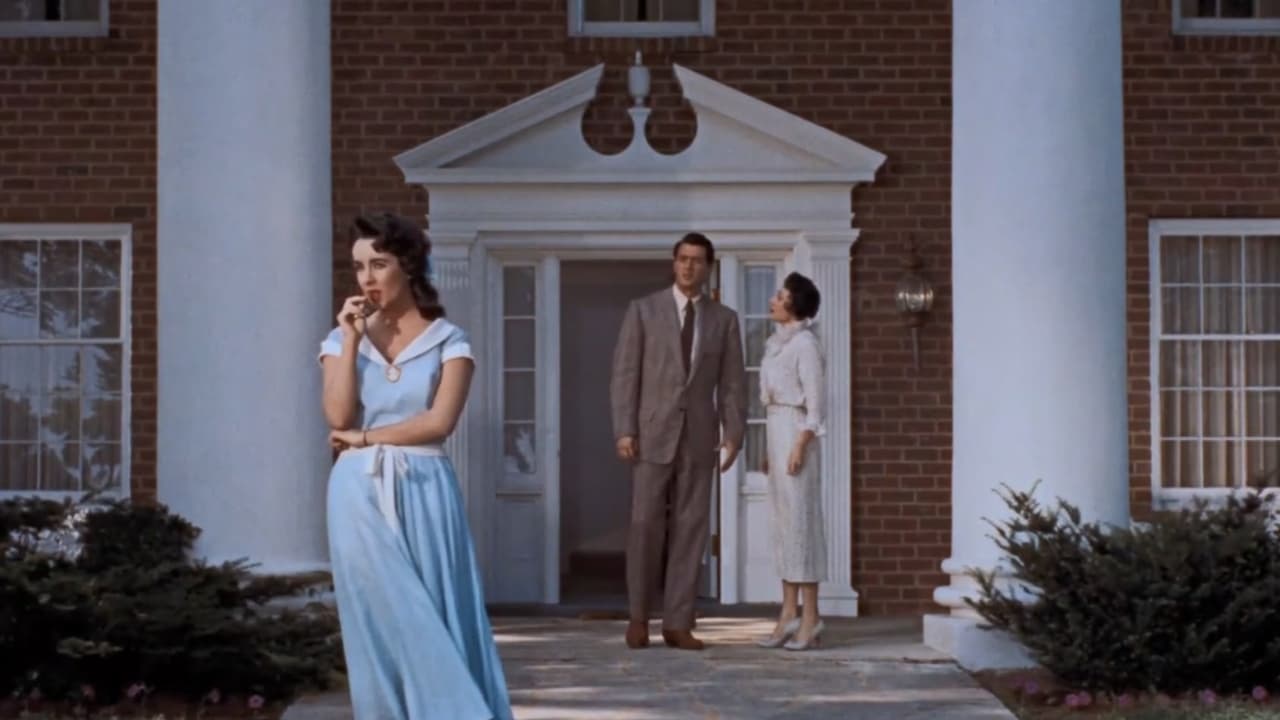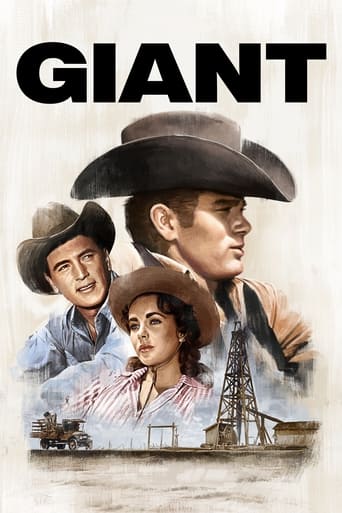

Intense, gripping, stylish and poignant
... View MoreA bit overrated, but still an amazing film
... View MoreI gave this film a 9 out of 10, because it was exactly what I expected it to be.
... View MoreExactly the movie you think it is, but not the movie you want it to be.
... View MoreTwo very different movies: score '10' for the first half; it has all the interesting characters and incidents The second half is a tedious melodrama and scores a '2,' and there all the positive is due to the sequence "Angel Obregón's Funeral." Hollywood makes very few films like this any more: A-list stars, expensive production values, serious themes. . . . Director George Stevens had been profoundly affected by his experience photographing the Nazi death camps. Rock Hudson is good to look at, but seldom conveys the gravity of a man convinced that the old ways are best and that change means decline. Elizabeth Taylor was 23 at the time and the camera captures her extraordinary beauty. James Dean will be a disappointment to many. His style of acting now seems mannered and fussy. The photography is very good, conveying the immense scale of West Texas as well as the intimate personal dramas.
... View MoreWell, after finally tackling this "epic" soap opera, is it truly deserving of all its hype? Beautiful Liz Taylor, handsome Rock Hudson, and strapping and intense and methodical Jim Dean, but overall the feeling is just mute, could not wait for the whole thing to just be over with. Compared to Gone with the Wind, it is such a snooze and no character here comes close to the audaciousness and spunk of Scarlett O'Hara or the beauty and goodness of Melanie Hamilton or the tower of strength that is Mammie. Rhett Butler would bitch-slap Rock Hudson's character silly if he had the chance.
... View MoreIn 1920s, a wealthy Texan cattle rancher (Rock Hudson) travels to East Coast in order to buy a prize horse. There he meets a woman (Elizabeth Taylor), the daughter of his soon-to-be business partner, who he ends up marrying after a quick romance. The movie follows their lives down in Texas as the seasons change and the old ways begin to give ground to the new century.Giant is an epic. It covers years and years of time and deals with all the prominent themes and problems of those decades. Things like oil business, racial issues, societal status, responsibility of the rich to the poor, and so many others, make an appearance and are addressed in turn. Taylor's character is the voice of the new age, while Hudson's is the voice of the old and their interactions are the driving voice of the film.And it works. It is a very interesting film to follow if you know anything about that particular span of history. The film is over three hours long, and can thus cover a lot of ground and give each subject its due time. Though that can be a problem as well. It is a very slow film, with deliberate, calm pacing. Nothing much really happens most of the time, or perhaps it would be more accurate to say that things happen very slowly. Personally I found the film to be perhaps a bit too slow and deliberate, but if old epics are your thing, you'll definitely get what you're looking for.Giant is to be applauded for its vision. It set out to tell a family saga in its full glory and in that regard it definitely delivers. From modern point of view it can a bit tedious, but I cannot in good faith condemn it for that.
... View MoreSpoilers ahead. So what happens in "Giant"? Or rather, what doesn't? PLOT POINT: Handsome, successful, suit wearing Rock brings Liz back to his ranch, to live forever. Immediately upon her arrival, she meets James Dean, a troubled, boyishly handsome ranch hand closer to her age. QUESTION: Will Liz find herself in a torrid love triangle, forced to choose between these two very different (but fascinating) men? ANSWER: Nope. She has little, if any interest in Dean, and only shares a few minutes of screen time with him. He does appear to be interested in her. But whatever is going on psychologically inside the Dean character isn't well dramatized on screen. He's mostly a mystery, a withdrawn, silent character. He does little if anything to actually try to win Liz's heart. At the end of the film, he seems to suggest that his unrequited love for Liz drove all his actions and ruined his life. But given how little interest Liz took in him, Dean ultimately comes off more like an emotionally immature, lovesick teenager than some tragic figure. And the film doesn't even bother to give us a Liz/Dean scene at the end, to provide closure to this part of the story. PLOT POINT: Upon her arrival, Liz also meets Rock's strong willed sister. She's been the queen of the ranch up until now. QUESTION: Will Liz and the sister fight over who is in charge of the ranch, and Rock? ANSWER: Nope. The sister dies shortly after Liz's arrival, in a completely arbitrary, random horse accident. PLOT POINT: Dean inherits a small patch of land adjacent to Rock's ranch. QUESTION: Will the two rivals, now living side by side wage war with each other in an epic battle for control? ANSWER: Nope. They mostly get along with only minor problems. When Dean's wealth reaches new heights, Rock simply sells out. PLOT POINT: Sal Mineo is introduced as a young man who is interested in ranch life, unlike Rock's own kids. QUESTION: Will Mineo, in time, become Rock's surrogate son, and new ranch head? ANSWER: Nope. Mineo is killed (off screen) during the war. The audience is subjected to a dull, unnecessary five minute funeral scene for his character. (While he was alive, all of Mineo's scenes combined represented about two minutes of screen time. The film inexplicably spends more time on his funeral than it did on him!) PLOT POINT: Once grown, Rock's and Liz's kids want to do things with their lives that are different from what their parents want for them. QUESTION: Will these disagreements create conflict in the family? ANSWER: Nope. Rock lets the kids follow their hearts. PLOT POINT: Rock's Latino daughter in law is refused service in the salon in Dean's huge hotel. Rock takes this as a very personal insult to his family by Dean. The two men fight. QUESTION: Does this represent a satisfying climax to the film?ANSWER: Nope. Technically, Rock is right. As the owner of the hotel/salon, Dean is ultimately responsible for what goes on there. But Dean doesn't seem like a racist. He's never said or done anything racist during the film. Also, Dean seems like an indifferent businessman, more lucky than smart. It's unlikely that he was even aware that these racist policies were even in place. Dean's culpability here is weak at best, and it seems like a tenuous foundation to build the climax of a three hour film on. PLOT POINT: At the end of the film, Rock and his family visit a diner. While there, they notice that the owner refuses service to a Latino family, one that Rock has never met and has no connection to whatsoever. QUESTION: Rock fights the manager, to express his outrage at the manager's racism, and to convince him to change this policy. The music score swells. Does Rock win? Does the final scene offer any kind of satisfactory conclusion to this would-be epic story? ANSWER: Nope. Rock loses and the diner will continue its racist policy. The film attempts to end on a happy note, showing that Rock now cares about people of color. But Rock never expressed any racist views in any prior scene, so this doesn't represent substantive character growth. (His affection for Sal Mineo seemed to suggest a man with no race or class prejudices.) Even if Rock had won, it's just a conflict between two men at a diner. For a three hour film called "Giant," it feels like an oddly inconsequential ending.
... View More